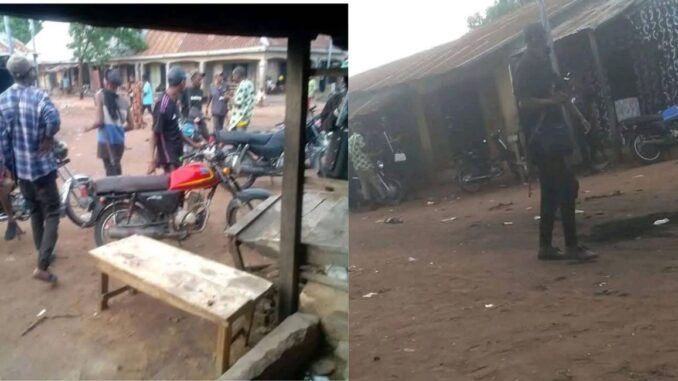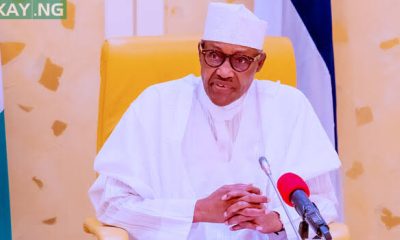News
Reps query NUPRC over N120 billion expenditure on personnel, overhead

The House of Representatives joint Committees on Finance and National Planning have frowned at the huge expenditure of over N120 billion by Nigeria Upstream Petroleum Regulatory Commission (NUPRC) on personnel and overhead cost annually.
Speaking during an interactive session with key agencies on the 2025-2027 Medium Term Expenditure Framework (MTEF) and Fiscal Strategy Paper (FSP), Chairman of the House Committee on Finance, James Abiodun Faleke (APC, Lagos) directed the agency to provide details of oil production, crude sales and other activities in the Upstream Petroleum Industry in the country.
NUPRC Executive Commissioner Economic Regulation & Strategic Planning (ECR&SP), Babajide Oluwole Fasina who represented the Chief Executive Officer (CEO) of the organisation, Gbenga Olu Komolafe had presented the revenue and expenditure before the committee.
Responding to the presentation, Faleke said “I’m wondering what type of organization you have.You are paying 88 billion as salaries. How many staff do you have? How many staff do you have?
“National Assembly, before the review, they give us N150 billion for our expenditure every year and that is shared between the Senate, House of Representatives, management and everybody.
“So only your agency is spending N88 billion. That’s why you have so much. So much money because of 4% cost of collection. 4% is too much. We need money…you are spending N88 billion on personnel, and you are spending over N40 billion on overhead.”
Despite trying to justify the figure, the Committee rejected the NUPRC’s explanation and demanded comprehensive records from the Commission as regards its revenues, expenditure and all other activities including exploration activities of Frontier Explorations’ at various Frontier Basins in the country where oil prospecting activities are taking place.
“You are going to come back with all the records of all the wells that produce the oil litre by litre per day. How much oil do we get from here every day,” Faleke asked rhetorically.
The lawmaker further said: “You are going to come back with records of shipments of crude either daily or weekly at what rate. You are going to come back with proposals of 2025 as to the expectations of two million five barrels per day, 2.06 million per day.
“And you reach out to the Frontier or whatever you called them. You come together with them and must come with the records of all Frontier activities, expenses incurred, crude oil realized from there and of course the sales proceeds and add what the Frontiers are doing. The day they started and how far they have gone. You must come here with them on the 18th. We expect you here on the 18th by 11am.”
Earlier in his presentation, Fasina informed the Committee that NUPRC derives its revenues from oil royalty, gas royalty, concession rental, gas flat penalty, miscellaneous oil revenues which include fines and levies, signature bonus and renewal of licenses.
Giving a highlight of the revenue collections, he said the NUPRC gets 4% Cost of Revenue Collection for the total revenue collected on behalf of the federal government which he said were credited directly to the Federation Account and while FAAC credits the 4% to the Commission.
He said, “The Cost Of Revenue Collection amounted to N114.84 billion in 2023 as against N114.38 billion in 2022. The amount released in 2023 includes N2.82 billion for Capital Expenditure, though N173.77 billion was due as 4% on the Actual Collections of N14.34 Trillion in 2023.
“The Commission also generates revenues internally such as, Registration Fees, Licence Fees, Fines, Recoveries, etc. It generated N1.44 billion in 2023 compared to N30.08 billion in 2022, and this accounts for 1.26% of the total Revenue realized in 2023 and 2.62% in 2022 respectively.
Fasina, however, informed the Committee that the Commission recorded a high expenditure in 2023 compared to 2022 by N11.46 billion which he said was an increase of 10.83%.
He added, “Personnel Cost which has the largest share amounting to N82.35 billion represents 70.19% of the total expenses of N117.33 billion, followed by Overhead Costs of N31.63 billion which accounts for 26.96 billion”.
The NUPRC Executive Commissioner however informed that, the Commission’s non-tax remittance dropped from N3.67 billion in 2022 to N1.77 billion in 2023 and an Amortisation and Depreciation of N246.66 million and N1.33 billion respectively.
Also, the Committee directed the Nigeria Bulk Electricity Trading to provide details of its budget performance and other activities in the electricity market.
The agency has in its submission informed the Committee about the ‘reason for disparity between Generation Companies (Gencos) invoices and amount invoices to Distribution Companies (DisCos).
The agency’s documents stated, “NBET invoices DisCos before receiving and verifying GenCo invoices as required by the settlement Calendar. This timing difference means that components such as interest and True-Up, which are included in GenCo invoices cannot be reflected in the invoices sent to DisCos, Consequently, the mismatch in timing leads to discrepancies in the amounts invoices.
“Apart from the DisCos, other off-takers such as Ajaokuta Steel Company and Net Importer Generation Companies are included in the invoicing process. The inclusion of these off-takers introduces further complexities that contribute to the disparity between actual invoices and the amounts invoices to DisCos.
“The supplementary order under the Transitional Electricity Market (TEM) framework mandates the use of specific tariff for invoicing Net Importer GenCos. These tariff requirements create additional differences between the amounts invoiced to GenCos and those passed on to DisCos.”
News
Reps Tackle CBN, OAGF Over Missing Grants, Bailout Funds

According to him, such financial mishandling not only disrupts critical public services and projects but also results in major losses to the nation’s purse—resources that could have been channelled into crucial services and developmental efforts, as laid out in Section 14(2)(b) of the Constitution.
Speaker Abbas, thereafter setup a Special Committee to be chaired by Rep. Chinedu Martins to immediately launch a probe into the “Utilisation of take-off grants, bailout funds, and interventions allocated to MDAs, government institutions, and GOEs from 2015 to present.”
News
Abuja light rail project must be commissioned on May 29-Wike vows

The FCT Minister, Mr. Nyesom Wike, expressed satisfaction with the progress on the Abuja light rail project, reaffirming its May 29 delivery as sacrosanct.
He made these assurances after inspecting the ongoing construction of access roads to the train stations on Wednesday, from Metro Train Station in the Central Area to Nnamdi Azikiwe International Airport, Abuja.
Reassuring journalists accompanying him, the minister reiterated that President Bola Tinubu would commission the rail project on May 29 to mark his second year in office.
The visited stations were Wupa station near Idu and Bassanjiwa station near the airport.
“This is part of our routine inspection of ongoing projects to see the contractors’ progress,” Wike explained.
“We are working day and night to fulfill our promise to President Tinubu and FCT residents. By May, Mr. President will ride on the Metro line.”
News
Just in: Alleged Herdsmen Armed With AK-47 Rifles Take Over Communities In Benue State

Gunmen suspected to be Fulani herdsmen are currently invading some communities in the Ukum Local Government Area of Benue State.
According to sources, the herdsmen armed with AK-47 rifles stormed the community around 04:15pm on Thursday.
“Our lives are in danger this evening, armed Fulani herdsmen, about 600 in numbers have taken over our communities this evening,” a resident told SaharaReporters.
“They’re currently moving around towns in Ukum Local Government Area of Benue state. No security personnel at all, Governor Alia didn’t send security, they said operation will start soon once they (herders) have observed the place.”
The insecurity situation in Benue has been alarming in recent weeks with attacks from gunmen suspected to be herdsmen.
The media had reported that suspected herdsmen again unleashed terror in Benue State, attacking three communities in Otukpo Local Government Area (LGA) on Wednesday, just a day after 11 people were killed in a deadly raid on Otobi community.
The latest victims of the escalating violence were Emichi, Odudaje, and Okpamaju, communities that had previously suffered an attack in February, which left five people dead.
However, the renewed attack has created fear and mass displacement among residents, with women and children fleeing to safety.
Local sources say the death toll from the fresh attack remains unclear, but several casualties are feared.
-

 News11 hours ago
News11 hours agoBREAKING: Unknown gunmen reportedly storm Senator Natasha’s family residence
-

 News14 hours ago
News14 hours agoSnub story on removal of Rivers Sole Administrator, it’s FAKE-Chief Registrar
-

 News20 hours ago
News20 hours agoFG expresses sympathy for CBEX victims, urges a united effort to combat Ponzi schemes
-

 News20 hours ago
News20 hours ago“How my father escaped assassination” – Bishop Oyedepo’s daughter
-

 News13 hours ago
News13 hours agoSAD! Again, Alleged Herdsmen Attack Three Benue Communities
-

 Politics13 hours ago
Politics13 hours agoPDP govs are jokers, can’t stop coalition train, Atiku boasts
-

 News6 hours ago
News6 hours agoAbuja light rail project must be commissioned on May 29-Wike vows
-

 News11 hours ago
News11 hours agoLawmaker Slams NBA Over Rivers Crisis, Demands Return of N300m

















